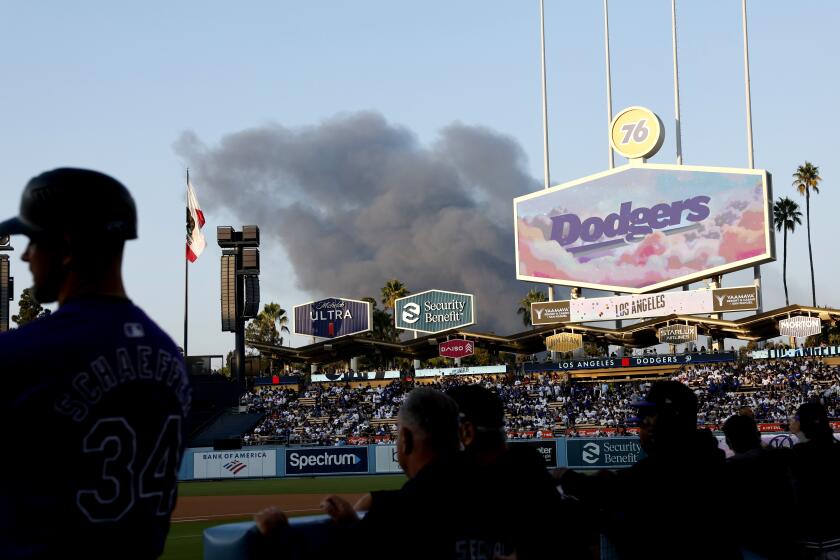Struggling to Pull Shattered Family Together
Inside his sparse Van Nuys apartment, Trayvon Walker clicks on a MySpace.com photo of a 17-year-old boy with chin raised, cheeks stretched and a full mouth strikingly similar to his.
“That’s my brother,” says Walker of the teenager he worries about so much lately.
He clicks on a different page and scrolls through photos of his 16-year-old sister, wondering if she has a boyfriend.
At 20, Walker is trying to click together the scattered lives of his brothers and sisters. Raised by the foster care system in California -- in which 42% of children are separated from one or more of their siblings -- Walker knows only pieces of their stories. Five of his seven siblings remain in foster care in Victorville, Hesperia, Pomona and Ontario, and only two live together. One sister is autistic. One brother is about to turn 13. The 17-year-old in the online photo is getting ready to emancipate from foster care. Of his two older brothers, one is in jail and he can’t find the other.
Walker wants the court or social workers to provide flexible visitation rights and transportation, so he can give his siblings still in foster care the parental figure that he never had.
He says it is up to him to pass on vital lessons in adulthood to his younger siblings, even though he lives 50 to 100 miles away. They are lessons every young adult should know but which those who grow up in foster care often learn the hard way: Don’t buy more groceries than you can carry on the bus. Call potential employers to follow up on job applications, even if they didn’t call you. Count school credits to make sure you’ve earned enough to graduate on time.
Nationwide, 20,000 young people become too old for foster care each year, with an estimated 4,000 in California. Foster children are supported by federal and state funding, and the law allows counties to keep them in care until they are 21.
But most leave foster care and step into adulthood on their 18th birthday, without a safety net.
A study of young adults who left foster care because of their age, conducted by the University of Chicago’s Chapin Hall Center for Children, found that 42% did not graduate from high school. Less than half were employed and 14% had been homeless.
Those who maintained strong ties to family members -- including siblings -- during their childhood in foster care were more likely to be enrolled in school or working, the report found.
“The majority of youth end up leaving care without having any relationships with anyone,” said Jennifer Rodriguez, legislative and policy coordinator for California Youth Connection, a nonprofit foster youth group. Preserving the sibling bond “needs to be a critical focus during emancipation.”
California requires the juvenile courts to consider at every court hearing sibling placement or visitation. But with a shortage of suitable homes -- especially those that accept sibling groups -- judges and social workers often can’t keep family members together.
“Our lawyers ought to be yelling and screaming in court in every single hearing where this isn’t done,” said Los Angeles County Juvenile Court Judge Michael Nash. “Our judges need to be beating up on everybody to make sure this is getting done.”
State law makes it difficult for siblings to contact each other after they have been adopted because of confidentiality rules -- an issue lawmakers are trying to change this year with a bill by Assemblyman Mark Leno (D-San Francisco) that would make it easier for siblings to find each other.
The Legislature approved an increase of more than $83 million this year for foster care. Most of that will be used to hire social workers, but $4 million will be set aside to help the thousands of foster care children who have no place to live when they become emancipated from the system.
Miriam Krinsky, executive director of the Children’s Law Center of Los Angeles, said more changes are needed so other foster youths don’t have the same experience as Walker.
Funding should be reallocated to help families instead of dismantling them, she said, and there needs to be more of an effort to locate and support relatives of children placed in foster care. Relatives, she said, are more likely to take siblings.
Walker was emancipated from foster care after living in 24 homes. He taught himself to iron, fold, shave, vacuum, shop, save.
In a dresser drawer, he keeps five old photos that he had laminated, one of each of his younger brothers and sisters. He knows the clock is ticking for them. So he squeezes advice, admonishment and nurturing into a few phone calls and typed lines.
When his sister jokingly writes on MySpace.com: “SHUT UP WIT ALL THAT NONSINCE.”
He writes back: “I’m glad you can spell.”
Sometimes he types simply: “I love you.”
She responds: “I love you to brother I will talk to you when I can.”
Born to a drug-addicted mother, Walker was placed in foster care as a baby. Until he was 5, he was with two older brothers, Flanagan and Robert. They argued as brothers do. Once, Walker ripped the fake balloons off Flanagan’s favorite clown lamp.
When Flanagan told school officials one day that Walker was being abused by their foster parents, the boys were taken away. Court psychiatric reports document Walker’s memories of being burned with an iron, pierced with thumbtacks and having pepper thrown in his eyes.
After being shuffled between homes, Walker and his older brothers were separated. He hasn’t seen Robert since. Flanagan is in jail.
Walker saw his five younger siblings a couple of times when his biological parents, who had custody of them at the time, brought them to visit him in foster care.
When Walker was 13, Flanagan called and told him their mother had died. A year later, their father died.
Walker cut his wrists and tried to hang himself with a rope he suspended from a ceiling sprinkler. A 2001 psychiatric report stated that Walker told his therapist at the time: “I don’t want to live, but you people keep telling me things will get better when I get older.”
A social worker helped Walker, who was living at MacLaren Hall, the now-closed county emergency shelter for foster children. On weekends she drove him to the Victorville house where his younger brothers and sisters had been placed with relatives.
One day, the social worker smelled marijuana in the relatives’ home. She reported it, and the children were removed. Each then entered his or her own cycle of foster homes.
Soon after, Walker was assigned a new social worker and the sibling visits stopped.
With the help of a school principal and a new foster mother who treated him like a son, things improved. Walker became an opinionated, articulate high school graduate.
He entered a transitional housing program and now studies computers at community college while working 35 hours a week at a courthouse.
He pays $204 a month in rent for his one-bedroom unit in a bright yellow building for tenants who qualify for low-income housing.
But he longs for his siblings.
“They’re my family,” Walker says. “I love them and I want them to be a part of my life.”
Inside his apartment on a June morning before heading to work, Walker calls Isabelle Barsoum, the social worker assigned to his siblings. He wants to find out when he can visit them.
A phone bill sits on the kitchen counter next to a stick of men’s deodorant. Freshly washed dress shirts hang on a window to dry. The refrigerator is stocked with food, but there are no magnets. All of his walls are bare.
Barsoum tells him his 17-year-old brother is not behaving at the group home where he lives with five other boys and that he won’t be allowed to visit with Walker until he shapes up.
In the last three years, Walker’s brother has lived in four group homes and attended three high schools. He is behind on credits. He has run away from his group home and been caught smoking cigarettes and marijuana. Walker fears his brother won’t be ready to emancipate from foster care.
Barsoum asks Walker to attend court-ordered monthly family meetings in Pomona, where her office is, on Wednesdays at 4 p.m. All of the siblings in foster care are required to be present, although one foster parent has not complied.
“I work during the week. It’s really hard,” Walker says. “All I’m asking for is a different kind of visitation.”
He wants arranged transportation and unlimited visits. He said he deserves this, especially because he completed a background check that came back clean.
Barsoum suggests he take the Greyhound bus, since he does not have a car.
Walker says that is not enough.
He asks if his 17-year-old brother can visit immediately, so they can have a serious discussion about his future.
It’s a complicated request, Barsoum says. She doesn’t work weekends. She can’t drive the children so far.
Over the next few weeks, Walker persists. He calls children’s lawyers seeking help. He calls Barsoum repeatedly, asking for his brother to be permitted to ride a train from Ontario to visit him.
On the Friday before Independence Day, Walker finds out his brother will be allowed to spend the next day with him.
Walker gets up at 6 a.m. for the two-hour trip to meet his brother at Union Station in downtown Los Angeles. They have not seen each other in six months. They hug awkwardly. Walker pays for both of their bus passes to Van Nuys.
Back at the apartment, hip-hop music videos flash on the television. Walker and his brother sit at the sand-colored dining table. They both wear baggy jeans adorned with painted designs.
His brother tells him he is behind on credits because he switched schools. Walker asks for copies of his report cards and transcripts. He asks whether his brother has a job.
“I’ve been trying to fill out applications but nobody ever calls me back, for some odd reason,” his brother says. “I tried Little Caesars, McDonald’s.”
“You don’t just put in applications,” Walker says. “They just sit there.”
Follow up with the employer, he tells his brother.
Walker moves on to the most troubling issue: his brother’s drug use.
“Weed is a gateway drug,” Walker tells him.
“Yeah, it’s a gateway, but I don’t mess with crack.”
It doesn’t matter, Walker tells him: “Most of the time when your parents are alcohol and drug addicts....”
” ... you tend to fall in there,” his brother says, finishing the sentence.
“Exactly,” Walker replies, continuing, “you can’t pick and choose a drug.”
Around 3:30 p.m., the two head back to Union Station. Walker tells his brother he loves him and to be safe. He knows seven hours wasn’t long enough to persuade his brother to change his ways.
They part, not knowing when they will see each other again.
More to Read
Sign up for Essential California
The most important California stories and recommendations in your inbox every morning.
You may occasionally receive promotional content from the Los Angeles Times.










